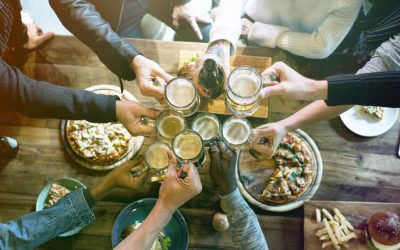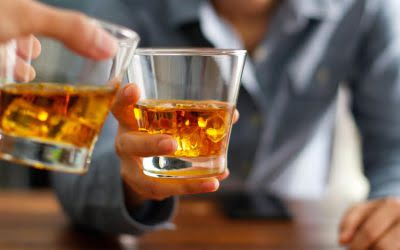A combination of alcohol use and depression can create difficulties in treatment. A person who uses alcohol and who has depression may not be able to tell which symptoms are due to which issue until they seek treatment. For many people, feeling sad or unhappy is a prominent symptom of depression. It can affect many aspects of a person’s life and can even be debilitating.
Alcohol use disorder

Some compounds can have characteristics of both depressant and stimulant drugs. Nicotine is one example, although it is most frequently characterized as a stimulant. When https://stephanis.info/2019/11/15/finding-parallels-between-and-life-2/ you stop drinking, though, that influx of GABA goes away and your brain is flooded with an overabundance of the neurochemical glutamate, which can trigger anxiety, says Volpicelli. According to Britannica, a depressant is a drug, medicine or other agent that slows down the function of vital organs in the body. The depressant effect of alcohol can get worse if you drink to excess. Drinking booze is about the worst thing you can do to solve any problem, but is particularly bad for depression.
What’s the Connection Between Alcohol and Depression?
People who develop AUD continue to consume alcohol despite experiencing negative consequences. This condition can have a negative effect on health, relationships, and emotional well-being. In the brain, alcohol increases the neurotransmitter gamma-aminobutyric acid (GABA), which results in lower levels of anxiety, stress, and fear. Neurotransmitters are the chemicals that control communication between nerve cells.
Risk of Dependence and Addiction

The Centers for Disease Control and Prevention has found that 9 out of 10 adult binge drinkers don’t have a severe alcohol use disorder, but that doesn’t mean alcohol isn’t a problem for them. Drinking to cope with depression, no matter if you have an alcohol use disorder, is concerning. Substance-induced depression is different from major depressive disorder and, by definition, should improve once a person stops consuming substances (such as alcohol). Over time, your brain’s reward pathway builds tolerance and requires more and more dopamine (via alcohol) to feel pleasure. This can lead to addiction and feelings of depression in the absence of the rewarding substance.
- When your liver finishes that process, alcohol gets turned into water and carbon dioxide.
- However, such effects aren’t always immediate, and issues can and often do build over time.
- Major depression and alcohol use disorder are also co-dependent in women, research suggests.
- Pancreatitis can be a short-term (acute) condition that clears up in a few days.
- Research shows that people with alcoholism find it difficult to recover from traumatic events.
In the short term, drinking alcohol can make you feel good, sociable, and even euphoric. If you’re undergoing alcohol withdrawal symptoms or want to reduce alcohol cravings, you may be prescribed medication. The FDA-approved options include naltrexone, acamprosate, and disulfiram.

Conditions
At the same time, people with depression may attempt to self-medicate with alcohol. For example, a person with frequent episodes of severe depression may turn to drinking to self-medicate. People who frequently drink are more likely to experience episodes of depression, and they may drink more in an attempt to feel better. The pathways resulting in the development of co-occurring alcohol use disorder and depression are complex and intertwined.

Local, state, and federal government websites often end in .gov. Commonwealth of Pennsylvania government websites and email systems use “pennsylvania.gov” or “pa.gov” at the end of the address. Before sharing sensitive or personal information, make sure you’re on an official state http://tomatocart.ru/space-uid-1478.html website. There are some daily changes you can make to reduce your anxiety.
- If you think you have a problem with either, talk to your doctor or therapist.
- Depression may even cause people to begin consuming large amounts of alcohol.
- Once your BAC reaches 0.2 mg/l or greater, its depressant effects on your respiratory system can become so powerful that they cause coma or death (3).
- You should avoid mixing alcohol with depressant or stimulant drugs due to the risk of severe side effects.
- Drinking profoundly alters an individual’s mood, behavior, and neuropsychological functioning.
- Benzodiazepines are one class of depressant drugs used to treat insomnia and anxiety, while prescription opiates are powerful products in this category.
- Heavy drinking can also lead to a host of health concerns, like brain damage, heart disease, cirrhosis of the liver and even certain kinds of cancer.
- It’s a little less clear why a sometimes crushing low replaces that initial high as your blood alcohol level decreases.
- During therapy, you can learn coping mechanisms that can help you return to life without drinking.
In turn, people who have ingested large amounts of alcohol have slower reaction times and may seem sleepy, disoriented, or sedated. It can increase your heart rate, aggression, and impulsiveness, as well as cause a surge in dopamine levels. However, https://www.cialpharmedi.com/2019/02/ while it has some stimulant effects — particularly in low doses — alcohol is mainly a depressant substance.
But if you have trouble managing your drinking, become fixated on alcohol, or keep drinking even though it may cause issues, you might have alcohol use disorder. Drinking persistently and excessively can increase your risk of developing a major depressive disorder. It can also aggravate symptoms of pre-existing depression and endanger your health and mental health. The immediate effects of drinking alcohol can help you feel more relaxed, more confident, and less inhibited. However, as these short-term effects wear off, other effects begin to take hold. This includes feelings of anger, anxiety, depression, and other negative emotions.